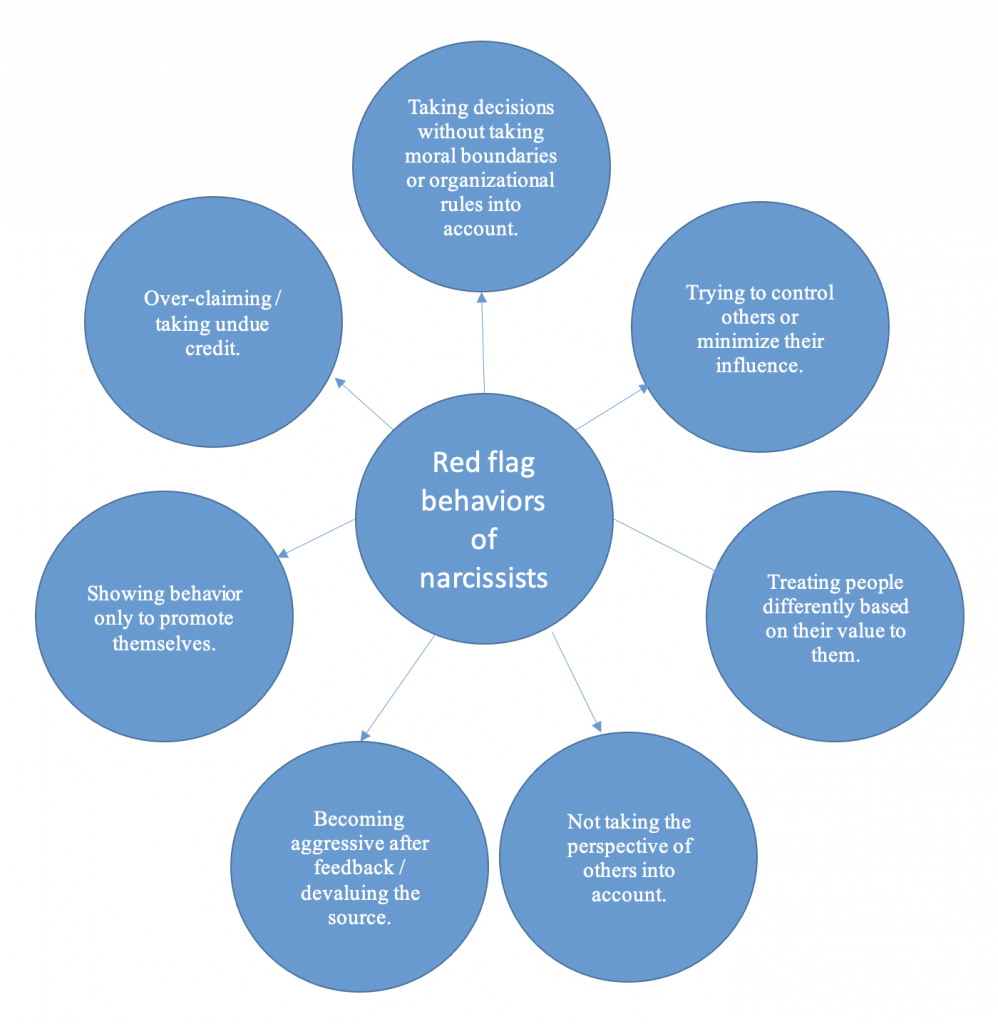During the month of December 2021, AMBITION will be highlighting its top 25 most-read articles of the year in reverse order, in the form of a thought leadership advent calendar. Here’s what is behind today’s door.
Narcissists in the workplace are very likely to cause problems but leaders the risk labelling ‘difficult’ employees as narcissists, potentially leading to the wrong interventions. Birgit Schyns and Barbara Wisse find out how leaders can deal with narcissistic colleagues
Originally published 5 January 2021.
The term narcissism goes back to Greek mythology, where Narcissus was cursed to fall in love with himself and ultimately die, as he could not take his eyes away from his own reflection, ending up dying of starvation.
Excessive self-love is still the main ingredient of modern-day research into narcissism, along with a strong sense of entitlement. Narcissism is characterised by extraversion coupled with selfishness and a strong need for attention and admiration.
This extraversion probably contributes to the fact that narcissists often appear charming, particularly when first meeting them. However, the charm tends to wear off over time and narcissists are much less appealing to people who know them better.
Social psychologist W Keith Campbell compares this phenomenon to eating a chocolate cake. While the first bites are delicious, subsequent pieces taste less great, and when you continue eating at some point a feeling of nausea arises.
The performance of narcissists in organisational contexts
Narcissists – arguably because of the positive first impression that they make on others- can do fairly well in organisational contexts. That is, narcissists do well in job interviews and are quite capable of landing a job. In addition, their social skills and their ambition often help them to end up in leadership positions. Intrigued by this, we wrote a theoretical paper about how narcissists (and other people with ‘Dark Triad’ personalities, such as Machiavellians and psychopaths) behave in organisations. What do they do? How do they differ from other employees? And of course, can we pinpoint certain behaviours that help us to spot narcissists before they get promoted in leadership positions where they can do a lot of harm?
Based on the existing literature around Dark Triad personalities in the workplace in general and narcissism in specific, we argued that even as regular employees, narcissists will behave in a strategic manner: they will make decisions about which goals they want to achieve and which actions will help them to achieve these goals.
Narcissists will mainly focus on own egocentric goals, rather than those of their leader, their colleagues, or their organisation. This can be problematic, as behaviour that disregards the interests of others or of the organisation as a whole and that is mainly self-serving, counterproductive, or destructive in nature can do a lot of harm. It is important to note that strategic behaviour is not limited to describe behaviour displayed by leaders.

Even though employees without a leadership role may not have the same amount of leeway in organisations as leaders do (usually rank-and-file employees have less power than leaders), their behaviour can be strategic nonetheless. While such employees might not be able to do the same amount of damage in organisations as leaders, we need to be aware that narcissists strive for leadership positions and that their behaviour as regular employees can serve as a first warning sign not to promote them further.
Exploiting situations
We argue that narcissists are apt at spotting and exploiting situations that may help them to reach their self-serving goals. For example, knowing that performance will lead them to achieve benefits, such as a better salary or a better position in the organisation, they are likely to perform particularly well when their performance is visible. Moreover, if given the chance they will opt for tasks that make them stand out and they will leave less visible tasks to their colleagues.
Narcissists are also unlikely to shy away from claiming the performance of others as their own, if it serves them. They might even try to control others in the organisation to maximise their own influence. This will lead to them treating colleagues differently based on how valuable they perceive them to be for their own goals: they may ingratiate themselves with those that seem successful and powerful, and be rude to anyone that they deem unimportant.
Their selfishness means that when they take decisions, they will not take the perspective of others into account nor do they feel hesitant to break any social or organisational rules. If their actions hurt others, so be it! At the same time, when they are mirrored their lack of performance, they are likely to become aggressive and devalue the source of feedback (‘who are you to evaluate me?’).
Dealing with narcissistic employees
Taking these strategic behaviours into account, how can organisations and leaders deal with narcissistic employees? Thinking about the main traits of narcissists, – their selfishness and achievement motivation- can help here. For example, since narcissists are likely to prefer performance in very visible tasks, a leader could charge them with specific tasks that give them a better opportunity to perform for an audience. Since it is difficult to get narcissists to accept direct feedback, steering them towards taking others into account by highlighting the benefit to themselves, might get narcissists to consider some more team-oriented behaviours. Additionally, organisational checks and balances and controlling if the performance they claim is really their own remains important. Organisations must make clear what types of behaviour are unacceptable, and if a transgression occurs, disciplinary action should be considered.
It is important to note that narcissists come in different shapes and forms. While the common denominator is that they show strong entitlement, some are more dominant and confident, while others are more defensive and sensitive. In the workplace, the latter can come across as particularly sensitive to (negative) feedback and react aggressively when they feel criticised, while at the same time, they will promote themselves much less than the more confident type of narcissist.
Narcissists in the workplace are very likely to cause problems. At the same time, the current surge in popularity of the term narcissism incurs the risk of labelling simply difficult employees as narcissists, potentially leading to the wrong interventions.


Birgit Schyns is Professor in Organisational Behaviour at NEOMA Business School.
Barbara Wisse is Professor of leadership and Organizational Behavior at the University of Groningen, and Professor of Management at Durham University Business School.
The article above is based on the research paper ‘Shady strategic behaviour: Recognizing strategic behaviour of dark triad followers’, by Birgit Schyns, Barbara Wisse, and Stacey Saunders which was published in 2019 in Academy of Management Perspectives (33,234-249).



